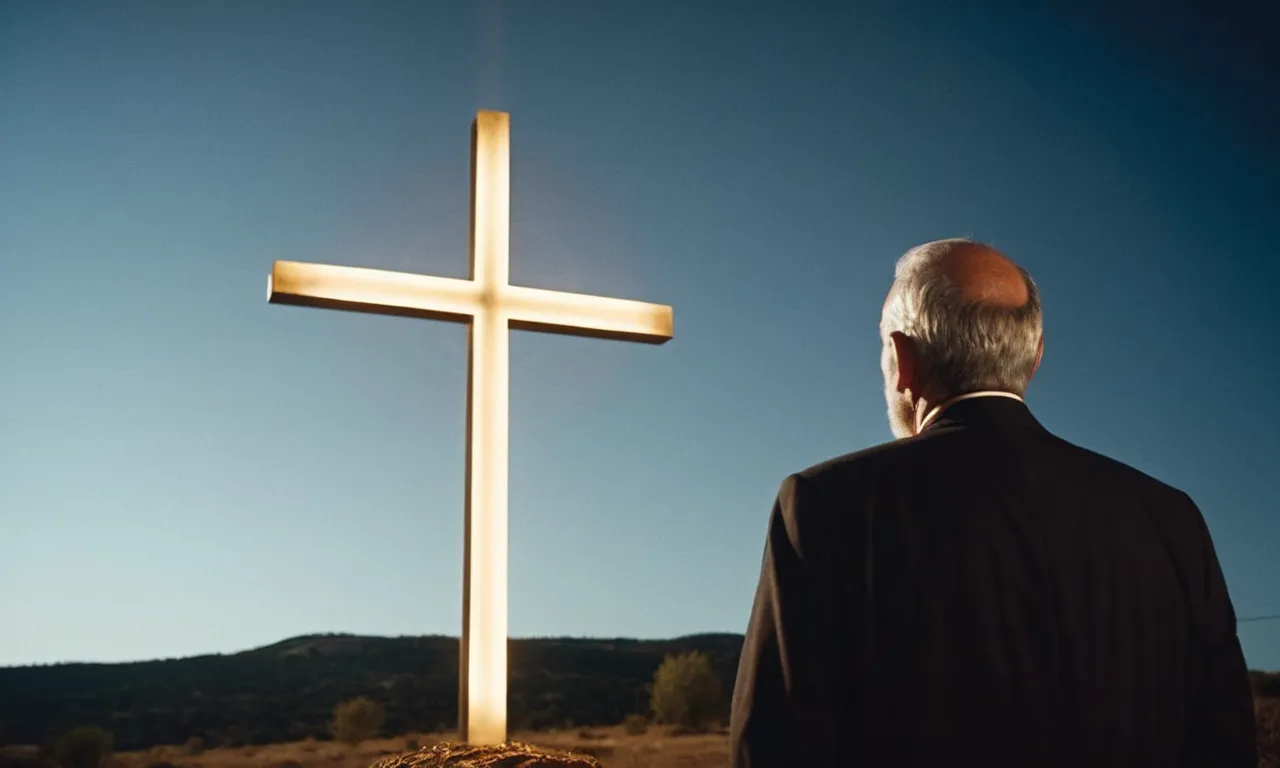Famous Atheists Who Converted To Christianity
Have you ever wondered if staunch atheists can change their beliefs and convert to Christianity?
Many famous atheist thinkers, after years of dismissing faith, have ended up embracing Christianity later in life. What compelling reasons did they have to make this monumental shift?
If you’re short on time, here’s a quick answer: Though starting as ardent atheists, high-profile figures like C.S. Lewis, Alister McGrath, and Antony Flew eventually found themselves convinced by the evidence for God’s existence and the truth of Christianity, leading them to publicly convert.
In this article, we will look at the stories of 5 famous 20th-century atheists who converted to Christianity, exploring the factors that challenged their atheism and led them to a profound change of heart.
C.S. Lewis
His Atheism & Conversion
C.S. Lewis was raised in a religious family in Belfast, Ireland, but he became an atheist in his teens. He remained an atheist through his studies at Oxford University and into his career as a professor at Oxford and Cambridge.
However, in 1929, Lewis had a conversation with his devout Christian colleague and friend J.R.R. Tolkien that set him on the path to converting to Christianity.
Tolkien helped convince Lewis that his atheism was inadequate to explain morality, meaning, and joy in the world.
Over the next few years, Lewis continued to resist fully embracing Christianity, though he became increasingly interested in its ideas.
In 1931, he first started believing in the divinity of Jesus after a lengthy talk with another friend and Christian thinker, Hugo Dyson.
However, it wasn’t until a trip to the zoo in September 1931 that Lewis fully converted to Christianity. He describes the experience in Surprised by Joy: “When we set out I did not believe that Jesus Christ is the Son of God, and when we reached the zoo I did.”
From that point on, Lewis considered himself a dedicated Christian.
Reasons for His Conversion
- Disillusionment with atheism’s inability to explain abstract concepts like morality, meaning, and joy
- Increasing appreciation for the profound wisdom and insight in Christian ideas
- Acceptance of Jesus Christ’s divinity after lengthy discussions with Christian friends
- A supernatural experience at the zoo that suddenly crystallized his belief
- Attraction to Christianity’s worldview of an inherent meaningfulness to human existence
In various books, like Mere Christianity and Surprised by Joy, Lewis expanded on his thinking. A few of his key points were:
- If there is no higher power or absolute truth, moral beliefs are just preferences with no basis for claiming objective validity
- Atheism provides no satisfying explanation for experiences of tremendous joy, such as those produced by art, nature, and love
- The gospels portray a Jesus who defies expectations – his teachings have a deep resonance of truth and wisdom
- Faith isn’t contrary to reason but goes beyond reason to provide meaning
In sum, Lewis felt atheism failed to fully align with human experiences of morality, meaning, and joy. Christianity offered a worldview that could better incorporate those facets of human existence.
Alister McGrath
His Atheism
Alister McGrath grew up in Northern Ireland in the 1960s during a time of significant religious tension and violence. As a teenager questioning faith, he adopted an atheist worldview that science and reason were superior to religion.
During his undergraduate studies at Oxford University, he deepened his commitment to atheism and became a vocal advocate for it.
His Eventual Conversion
However, while studying science at Oxford, McGrath began having doubts about his atheism. He started realizing science could not answer deeper questions about meaning, purpose and ethics. This initiated a period of intense questioning and soul-searching.
After thoroughly investigating the evidence for and against faith, McGrath finally converted to Christianity, stunned by the historical validity of Jesus’ resurrection.
McGrath found the Christian worldview provided a better framework for understanding reality than atheism.
The turning point came while spending a summer researching molecular biophysics in East Germany, when he had a profound religious experience gazing out over the forests and fields that convinced him of God’s presence and love.
Post-Conversion Defense of Faith
After converting, McGrath dedicated himself to vigorously defending and commending the Christian faith. He wrote bestselling books like The Dawkins Delusion and Mere Apologetics that engage atheist arguments and make a positive case for belief.
McGrath stresses that faith and science are not incompatible, but complementary ways of understanding our complex world.
Today, Professor McGrath teaches historical theology at Oxford University, where he once promoted atheism. He argues atheism cannot fully account for realities like self-sacrificial love and absolute moral truth.
McGrath contends Christianity uniquely offers satisfying answers to the deepest longings and questions of the human heart.
Antony Flew
His Atheism
He was known for his groundbreaking 1950 paper “Theology and Falsification” and went on to author over 30 books, many of which argued that belief in God was irrational.
However, in his later years, Flew began to have doubts about his staunch atheism.
His Gradual Shift
The seeds for Antony Flew’s shift away from atheism were planted in the early 2000s. He stated being impressed with scientific evidence for fine-tuning in the universe and insights from the intelligent design movement.
He also cited Aristotle’s writings on God and gradually developed a more open approach to spirituality. Though not fully embracing theism yet, it marked a profound change from his earlier dogmatic atheism.
Full Conversion to Deism then Christianity
By 2004, Antony Flew fully gave up atheism and announced his switch to deism – the belief in an intelligent Creator God.
He later revealed he also embraced the afterlife. What finally convinced Flew was scientific evidence that DNA is far too complex to have originated by unguided chance.
Overall, his intellectual journey toward God was gradual, driven by where evidence seemed to point rather than dogma.
In his final years, some historians state Flew also developed an affinity for Christianity, believing the risen Jesus was likely the “Son of a God.”
While not necessarily a full Christian convert, it was a remarkable evolution for perhaps the 20th century’s most renowned atheistic scholar.

Francis Collins
Atheism to Christianity
Francis Collins was raised on a small farm in Virginia in a home that emphasized religion and faith.
However, as a student studying chemistry, he began questioning his faith and eventually came to describe himself as an atheist in his 20s.
However, Collins remained interested in the big questions of life, such as “Why are we here?” This led him to start examining the evidence for and against faith from an intellectual perspective.
He was particularly struck by the moral argument for the existence of God put forward by C.S. Lewis, which resonated with his own sense of right and wrong.
After several years of grappling with these issues, Collins finally came to the conclusion that belief in God was reasonable. He reconverted to Christianity in his late 20s, finding great intellectual and personal fulfillment in his faith.
Christian Faith Strengthened by Science
As a leading geneticist and head of the Human Genome Project, Collins has had an up-close look at the marvels of God’s creation.
He sees the scientific enterprise as complementary to faith, revealing truths about biological life that inspire awe and bring one closer to God.
In Collins’ view, scientific discoveries do not contradict Christian beliefs but actually reinforce them. Unlocking the mysteries of DNA and the complexity of life has deepened his appreciation of God’s creative genius.
He believes the progression from molecules to living cells to human minds far exceeds what unguided nature could produce.
Francis Collins stands as an exemplar that rigorous science and authentic faith need not be at odds. For him and many others, science enhances spiritual wonder rather than diminishing it.
Faith provides purpose and meaning, while science describes the mechanisms of the natural world that God has engineered with such artful brilliance.
Peter Hitchens
Militant Atheist
Peter Hitchens grew up in an atheist household and adopted his parents’ secular worldview. As a young man, he was a militant atheist who viewed religion with hostility and derision.
However, over time Hitchens began to have doubts about his staunch atheism. He started noticing that many intelligent, thoughtful people were religious believers. This caused him to wonder if his dismissal of religion had been premature.
Step-by-Step Shift to Christianity
Hitchens’ movement toward Christianity was gradual. According to an interview in The Guardian, it began with an appreciation for the poetic beauty of the King James Bible during an attempt to write a poem about Cain and Abel.
Next, Hitchens developed an admiration for individuals like John Henry Newman, the famous 19th century Anglican priest who converted to Catholicism. Newman’s piercing intellect and eloquent writing impressed Hitchens deeply.
He began to think, “If someone like Newman could believe, there must be something to faith that I am missing.” The third step came during a visit to the ancient Christian church of St Thomas in Moscow.
As Hitchens stood quietly gazing at an Orthodox icon of the Virgin Mary, he had a profound and unmistakable sense that her eyes were “full of love and grief for mankind.”
This deeply moving encounter paved the way for Hitchens’ eventual conversion.
Conclusion
Though they began as atheists, these famous thinkers could no longer deny the compelling evidence that led them to eventually embrace faith in God and Christianity.
Their conversions required humility and willingness to follow the evidence wherever it led.
Their stories illustrate that a serious search for truth with an open mind can lead thoughtful atheists to find God and spiritual rebirth through Christ. As we have seen, logic, reason, science, and experience can all provide avenues to faith.








